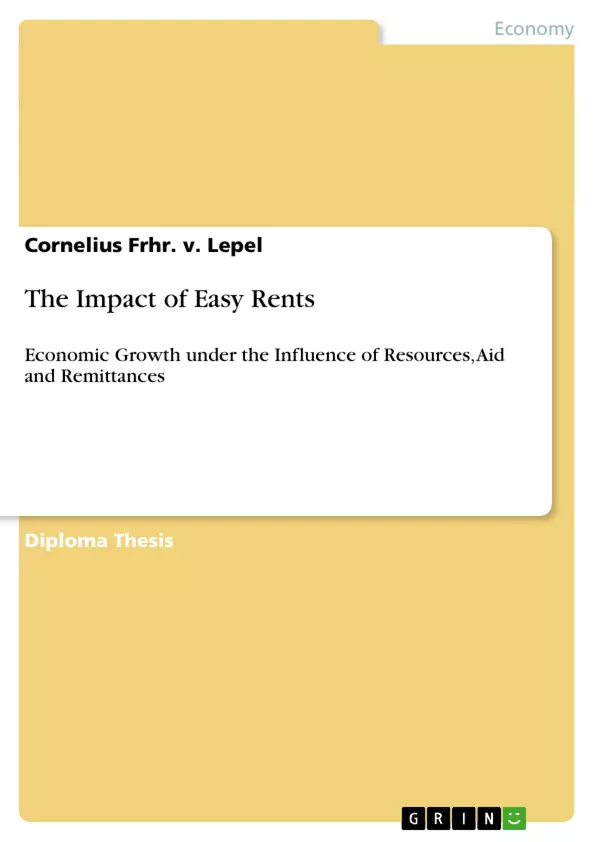This paper addresses a ma jor paradox of the economic world, the seemingly negative impact of wealth in form of natural resources and development aid on growth. In the last 50 years a striking discrepancy in the economic performance of countries blessed by massive windfall gains became obvious. Robust empirical evidence was produced showing an inverse relation of both natural resources and development aid on economic growth. Regressions involving migrant's remittances did also yield ambiguous results under certain conditions. I try to embrace all windfall gains under the notion of "Easy Rents", characterised by easy generation of, easy access to and easy control over the abundant monetary assets.
The influence of the rents is proposed to work through biased price distortions, induced by sectoral competition, rent-seeking and \bad" economic policy, creating unfavourable conditions for the growth-driving tradables sector.
The conducted research and empirical testing indicates the appreciation of relative prices caused by political and economic disturbance. Following the results, a strong tendency of "Easy Rents" to exert deteriorating influence on a economy seems to be in place.
Inhaltsverzeichnis (Table of Contents)
- Introduction
- The Model
- Fundamentals
- Dynamics
- Easy Rents
- Basics
- Natural Resources
- Development Aid
- Remittances
- Dutch Disease
- The culprit "tau"
- Reality Check
- Concluding Remarks
Zielsetzung und Themenschwerpunkte (Objectives and Key Themes)
This paper examines the seemingly paradoxical negative impact of wealth, in the form of natural resources and development aid, on economic growth. It focuses on the discrepancy in economic performance between countries blessed with windfall gains and those without, highlighting the inverse relation between natural resources and economic growth. The paper explores the concept of "Easy Rents" – easily generated, accessed, and controlled monetary assets – and its impact on economic growth through biased price distortions, sectoral competition, rent-seeking, and potentially harmful economic policy.- The impact of "Easy Rents" on economic growth
- The relationship between natural resources, development aid, and economic growth
- The role of price distortions and sectoral competition in economic development
- The influence of rent-seeking and policy choices on economic outcomes
- The concept of "Dutch Disease" and its relevance to resource-rich economies
Zusammenfassung der Kapitel (Chapter Summaries)
- Introduction: This chapter introduces the concept of "Easy Rents" and sets the stage for the paper's investigation into the paradox of resource wealth and its potential negative impact on economic growth. It highlights the historical context of the OPEC-led oil price increases in the 1970s, which generated substantial windfall gains for oil-exporting countries, and the subsequent discrepancy between expectations and observed outcomes in terms of economic development.
- The Model: This chapter delves into the theoretical framework that underpins the paper's analysis. It introduces the core concepts and assumptions that will be used to understand the dynamics of "Easy Rents" and their influence on economic growth.
- Easy Rents: This chapter focuses on the different types of "Easy Rents" and their impact on economic development. It examines the role of natural resources, development aid, remittances, and the phenomenon of "Dutch Disease" in shaping the economic landscape of resource-rich nations.
- Reality Check: This chapter provides empirical evidence and case studies to support the theoretical framework and examine the real-world effects of "Easy Rents" on economic growth.
Schlüsselwörter (Keywords)
This paper explores the influence of "Easy Rents" on economic growth, examining the relationship between natural resources, development aid, and economic development. Key concepts include price distortions, sectoral competition, rent-seeking, and "Dutch Disease." The paper seeks to shed light on the complex dynamics of resource wealth and its impact on economic outcomes.- Quote paper
- Cornelius Frhr. v. Lepel (Author), 2007, The Impact of Easy Rents, Munich, GRIN Verlag, https://www.grin.com/document/132715



